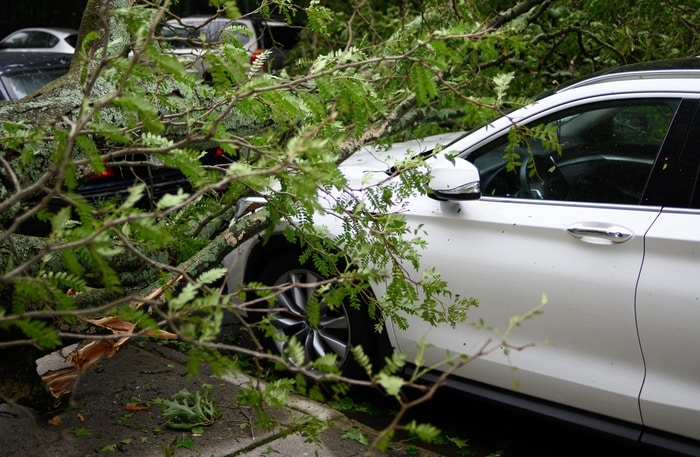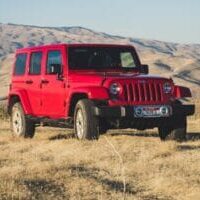Comprehensive vs. collision insurance
What is the difference between comprehensive and collision insurance?
Comprehensive auto insurance applies to covered incidents beyond your control, including theft and weather-related damage. Collision auto insurance helps cover your vehicle if you’re in an accident—even if you’re at fault.
If you’re shopping for auto insurance coverages, you’ve likely come across the terms comprehensive and collision insurance. But you may not be familiar with what these terms mean, what they cover, and the similarities and differences between them. We help break it down and provide the information you need to make an informed decision.
An overview of comprehensive and collision auto insurance
Comprehensive insurance
- What it covers: Incidents that damage your car through no fault of your own and beyond your control. That includes:
- Weather-related damage, such as hail
- Vandalization
- Theft
Comprehensive insurance often takes special circumstances into account. If you accidentally hit an animal, for example, it’s considered out of your control—and therefore, covered by comprehensive insurance. If you live or frequently drive in a rural area with a high deer population, comprehensive insurance can provide significant value.
When searching for any kind of car insurance, explore many options. We recommend reviewing different types of coverages and comparing prices between different plans and companies. Start by requesting a free, quick quote from A Better Choice Insurance.
- What it doesn’t cover: Damage directly related to at-fault accidents—that’s where collision insurance comes in.
- Deductible: When purchasing your insurance, you’re able to select a deductible. The deductible is the amount you pay toward a claim before your insurance provider begins contributing. For example, let’s say you have a $500 deductible and your car’s door gets dented. Fixing the door costs $1,200. You’ll pay the initial $500, and your insurance covers the rest.
- Limits: Different than a coverage like liability, comprehensive insurance doesn’t offer multiple limits for you to choose from. The limit for comprehensive is typically equal to the value of your vehicle. If your car is worth $15,000, your insurance won’t cover you beyond that amount.
Collision insurance
- What it covers: Collision insurance will cover your vehicle if you’re in an accident—even if you caused the accident or if you hit a stationary object.
- What it doesn’t cover: Collision insurance doesn’t pay for damages covered by comprehensive insurance, such as weather damage. It also doesn’t cover damage to another person’s vehicle or medical costs. That’s what liability insurance is for.
- Deductible: Like comprehensive, you’ve got a choice to select a deductible during your insurance purchase. Once you’ve selected your collision deductible, that’s the amount you’ll pay on a claim if your car is damaged in an accident. Your insurance provider will cover the rest of the damage costs, up to the limit of your vehicle’s value.
- Limits: There aren’t traditional limit options to choose from for collision insurance. However, the maximum amount your insurer will help cover for collision is likely equal to the total value of your car.
Get a quick quote. Drive protected with comprehensive and collision insurance.
Similarities between collision and comprehensive insurance
These two types of auto insurance have the following in common:
- Comprehensive and collision aren’t required by the state, but if you have a loan on your vehicle, your lienholder may require these coverages
- Both coverages help get your car’s damages repaired
Differences between comprehensive and collision insurance
Although both of these coverages protect your vehicle, the main difference between them is the type of incident that causes the damage.
Types of comprehensive damage
- Vandalism
- Theft
- Weather
- Animals
Types of collision damage
- You hit a vehicle
- Another vehicle crashes into your car
- You crash your car into a tree or a fence post
What to consider when purchasing comprehensive and collision insurance
- Location: If you live in an area where accidents are relatively common, vehicle owners frequently experience theft, or severe weather is a seasonal threat, consider purchasing both collision and comprehensive insurance.
- Vehicle use: If you frequently use your vehicle, we recommend purchasing collision insurance. The more time you spend on the road, the more likely you are to be involved in an accident.
- Vehicle value: Your insurance company will insure your vehicle for the amount it’s worth. If you’ve got a relatively new vehicle, you’d want to consider these coverages more than if you owned an older vehicle. Your newer car is likely in better condition and worth more, and replacement parts tend to be more expensive. For example, if your car is worth $20,000, you’re eligible for a higher level of insurance coverage than if your car is worth $10,000.
Request an insurance quote. Save with A Better Choice Insurance.
Costs of comprehensive and collision insurance
The costs of comprehensive and collision insurance are based on similar pricing factors as your overall insurance policy. Along with the factors we listed above, your insurance provider may also consider your age, credit score, driving record, and type of vehicle. Together, these factors will help determine your coverage limits, deductibles, and premiums.
When to drop your collision or comprehensive insurance
If your car is on the older side and not worth much, you may be paying more for comprehensive and collision insurance than your car is worth. Also, if you don’t drive very much or you’ve parked your vehicle in a safe, secure location, talk with your agent to determine whether your coverages are providing value.
Get the best comprehensive and collision insurance
Originally Published on Dairyland Blogs On September 29, 2021





